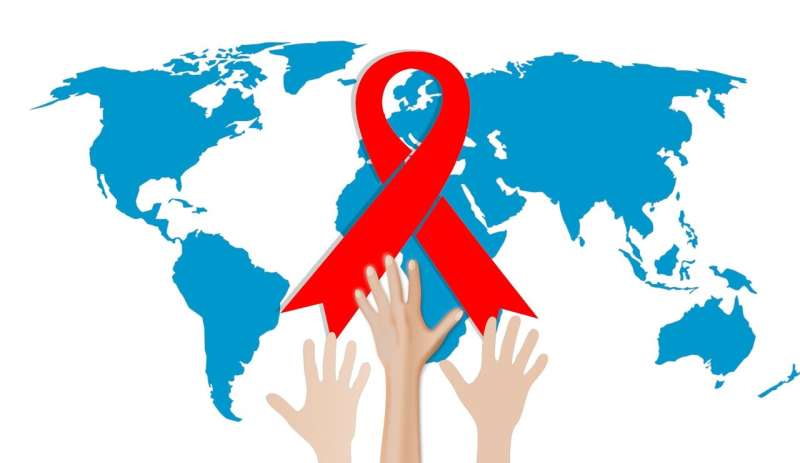This article has been reviewed according to Science X's editorial process and policies. Editors have highlighted the following attributes while ensuring the content's credibility:
fact-checked
peer-reviewed publication
trusted source
proofread
Study explores gender differences in HIV-related stigma and social support in the Dominican Republic

For people living with HIV (PLHIV), an important barrier to receiving timely HIV care is the stigma associated with the disease. HIV-related stigma has been associated with lower rates of HIV testing, denial and lack of disclosure of HIV status, delays in HIV-related treatment, and poor antiretroviral therapy (ART) initiation and adherence.
In low-resource settings such as the Dominican Republic (DR) in the Caribbean, which has the highest adult HIV prevalence outside of sub-Saharan Africa, HIV-related complications are the fifth-leading cause of death and ART coverage rate is 52%. Previous studies have found that the effects of HIV-related stigma and low social support are common among women living with HIV, but no studies to date have explored the differences in HIV-related stigma and social support by gender in the DR.
In a study recently published in PLOS ONE, lead author and postdoctoral researcher Alane Celeste-Villalvir and colleagues set out to understand these gender differences in HIV-related stigma and social support among PLHIV experiencing food insecurity in the Dominican Republic (DR).
"Previous studies have noted that women living with HIV are more often stigmatized and isolated than men for having HIV, and shamed publicly, name-called, and blamed for bringing HIV into the home or community, even when a male partner is also living with HIV," notes Alane Celeste-Villalvir.
The research team conducted interviews with patients at two HIV clinics, identifying themes regarding stigma experiences and social support, which were then compared across men and women participants to identify gender differences. This qualitative study comes from a formative research component of a community-partnered study led by senior author and Professor of Community Health Education Kathryn Derose when she was at the RAND Corporation, with colleagues at partner institutions that include the Universidad Autónoma de Santo Domingo, the Dominican Ministries of Agriculture and Public Health, the Dominican National HIV/AIDS Council (CONAVIHSIDA), the World Food Program, UC-Irvine, and UC-San Francisco.
The aim of the overall study was to develop and pilot test an integrated urban garden and peer nutritional counseling intervention with PLHIV experiencing food insecurity to improve ART adherence and treatment outcomes. This intervention is currently being tested in a larger five-year community-partnered study.
Among the topics in the interview guide, participants were asked about their experiences with diagnosis, physical and mental health changes, social relationship changes, social support, feelings of guilt or shame, and whether they have been victims of verbal or physical violence.
Following conceptual frameworks on HIV-related stigma, responses were catalogued across three categories: experienced stigma, such as interpersonal or community stigma (e.g., verbal abuse); anticipated stigma (e.g., anticipated rejection such as losing job); and internalized stigma (e.g., feelings of shame and guilt).
"While these types of stigma have been found to cause delays in HIV treatment, poor ART initiation and adherence, cause social isolation, and lower HIV resilience, it was not well known how these different types of stigma may be differentially experienced by gender," explains Celeste-Villalvir. "Our study found several differences between men and women in their experiences of HIV-related stigma with important implications for addressing this pervasive and persistent barrier to optimal HIV outcomes."
The researchers note that while both men and women described experienced stigma, men's experiences of stigma were subtler and women described outright rejection and instances of physical violence, including intimate partner violence. Both men and women described job discrimination, but women described severe disempowerment as well as permanent loss of income and/or employment whereas men described temporary changes in employment and/or decrease in income. Men and women both described modifying behavior due to anticipated stigma, but only women discussed isolating themselves and discomfort taking HIV medication in front of others.
Regarding internalized stigma, both men and women described shame, guilt, and depression over their HIV status, though these experiences were more common among women. Women's experiences prevented health care-seeking and included suicidality, while men sometimes blamed women for their HIV status and expressed a desire to "move on" and "look ahead."
Further, while both men and women described receiving community support, women most frequently discussed receiving support from family and friends and using religiosity to cope, whereas men referenced general family support and government benefits and were less forthcoming about personal relationships and social networks, oftentimes not disclosing HIV status to others.
"The social context of HIV-related stigma affects women and men differently with physical and mental health impacts and may require distinct mitigation approaches," notes Derose. "This study provides valuable insight for development of targeted health promotion interventions to reduce stigma and improve HIV health outcomes."
The researchers conclude that while "community-level and systems-level interventions are needed for all PLHIV, specific interventions should consider the discrimination, violence, and stigma faced by women." They recommend large scale educational and health promotion campaigns to help reduce stigma and provide knowledge about how HIV can be prevented, transmitted, and adequately treated. They also recommend interventions around gender-based violence and intimate partner violence to both prevent instances of violence, facilitate case identification, and to provide support to victims.
They conclude, "These initiatives may lend HIV more visibility and promote widespread awareness, normalizing and destigmatizing HIV and PLHIV, an effort that may reduce the impact of stigma and improve both HIV-related health outcomes and the overall quality of life of PLHIV."
More information: Alane Celeste-Villalvir et al, Exploring gender differences in HIV-related stigma and social support in a low-resource setting: A qualitative study in the Dominican Republic, PLOS ONE (2023). DOI: 10.1371/journal.pone.0290228




















